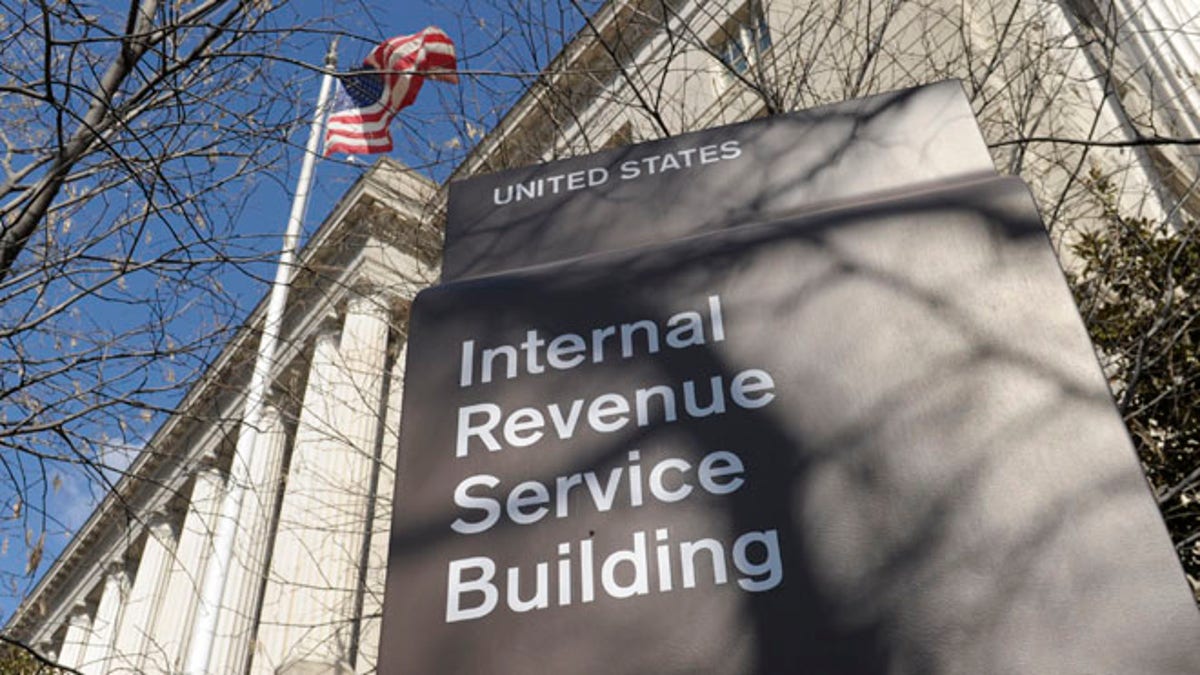
March 22, 2013: This file image shows the exterior of the Internal Revenue Service building in Washington. (AP)
The IRS has taken "significant actions" to stop agents from targeting political groups based on their names and policy positions, according to a report issued Thursday by the government watchdog who disclosed the inappropriate activity two years ago.
The agency's inspector general says the IRS is doing a better job of processing applications for tax-exempt status. His report said the IRS has eliminated intrusive, unnecessary questions, and has cleared a backlog of applications that had languished for months and years.
The IRS has improved training for agents, the report said, although the inspector general recommended even more training.
The report is a follow-up to the inspector general's 2013 audit, which said agents had inappropriately singled out tea party and other conservative groups for extra scrutiny when they applied for tax-exempt status during the 2010 and 2012 elections.
The 2013 audit blamed poor management. It ignited a firestorm that led to numerous congressional investigations and the replacement of much of the agency's top management.
John Koskinen, a former turnaround specialist, was confirmed as the new IRS commissioner in December 2013. He has vowed to restore trust in the agency, though he has sparred with Republican lawmakers over the IRS budget and the agency's efforts to cooperate with congressional investigations.
Most of those investigations continue, including another one by the inspector general looking into thousands of lost IRS emails that could be related to the tea party controversy.
"The IRS has taken significant actions in response to the recommendations made in" the 2013 report, said J. Russell George, the Treasury inspector general for tax administration.
The 2013 audit found that agents were singling out groups with "tea party" or "patriot" in the name. They also singled out groups that talked about "limiting/expanding government, educating on the Constitution and Bill of Rights, social economic reform/movement," the audit said.
These terms appeared on "be on the lookout" lists that agents used when scrutinizing applications for tax-exempt status under section 501 (c) (4) of the federal tax code, which is for social welfare groups.
Some progressive and liberal groups also faced long delays in having their applications processed, and several progressive terms appeared on the "be on the lookout" lists. However, investigators have said it does not appear that progressive groups faced the same level of scrutiny as conservative ones.
George said the IRS no longer uses these lists.
The IRS issued a statement saying it appreciates the inspector general's "acknowledgement of the significant actions we took" to address the recommendations in the 2013 audit.
The American Center for Law and Justice, which represents dozens of conservative groups that say they were harassed by the IRS, dismissed Thursday's report.
"To suggest that the unlawful IRS targeting scheme has somehow been resolved is not accurate," said Jay Sekulow, chief counsel at ACLJ.
Despite the report, Sekulow said, "The IRS still remains institutionally incapable of self-correction. No one has been held accountable. And the unconstitutional targeting continues, with one of our clients still waiting — after more than five years — for a determination on their application."
The inspector general said 296 groups were originally singled out for extra scrutiny. Among them, 215 have had their applications approved and seven have been rejected. A total of 36 withdrew and 27 stopped responding to IRS inquiries, the report said.
Of the remaining 11, six have sued the IRS and five are appealing an "adverse" ruling as part of the agency's internal appeals process, the report said.
The scandal erupted just as many of these so-called social welfare groups were playing a bigger role in electoral politics. Unlike other charitable groups, social welfare groups can participate in political activity, but it can't be their primary mission.
Donations to these groups are not tax deductible. But groups can keep the names of their donors private.
It is up to the IRS to determine whether a group qualifies as a social welfare group.
The Treasury Department is in the process of drafting new rules for these groups. Treasury's first stab at new rules was criticized by both conservatives and liberals, generating a record 150,000 comments.
The department pulled the rules back last year and decided to try again. It is unclear when new rules will be unveiled.
Thursday's report was limited to assessing how well the IRS has implemented recommendations from the inspector general's 2013 audit. The inspector general is also investigating thousands of lost emails to and from a central figure in the controversy.
The IRS said it lost an untold number of emails by former IRS official Lois Lerner, who led the division that processes applications for tax-exempt status. The IRS said the emails were lost when Lerner's computer hard drive crashed in 2011.
The inspector general's office is in the process of trying to recover more than 6,000 of Lerner's lost emails that were found on old backup tapes. The IG is expected to issue a report after its work is complete.
Lerner has since retired from the IRS. Last year, the House voted mostly along party lines to hold Lerner in contempt of Congress for refusing to answer questions a pair of committee hearings. In March, Ronald Machen, the outgoing U.S. attorney for the District of Columbia, announced that the Justice Department won't seek criminal contempt charges against Lerner.




